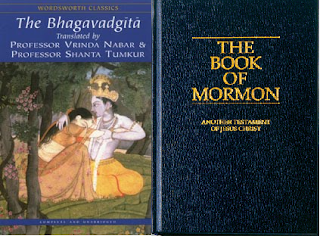Why are there so many rules in religion?
Are all the rules of my religion “Eternal Laws” based on the doctrine of God? Are they Principles based on that Doctrine? Are they temporary applications of doctrine given for a specific purpose?
I am a member of the LDS or “Mormon” church. I was born in the faith. I believe it, I try to live it, and I frequently ponder upon my faith, my religion, and why I believe what I believe.
Which led me to a realization – The book "Doctrine and Covenants" is modern day Deuteronomy.
Doctrine and Covenants is a book of Scripture recognized by the Mormon faith. It details many revelations from God given to Joseph Smith and a few other early prophets of the Church.
While the majority of the book says how to organize the church – it also lays out rules. Here are a few of the most well known:
No drinking Alcohol, using Tobacco, or ingesting “Hot Drinks” later defined as “Coffee and Tea.”
(Besides all the rules in Doctrine and Covenants the church today has many more rules such as “don’t date until age 16” etc...)
Deuteronomy also has rules. (613 if I counted correctly)
Don’t eat Pigs. Don’t wear clothes with 2 kinds of fabric. Don’t shave. Kill anyone who worships a different God. Etc..
These (to me) sound silly or just plain wrong. I mean really - What’s wrong with eating bacon or wearing a poly/cotton blend? I also can't ever imagine murdering a man because of his belief.
I eat pork all the time including last night for dinner. I don’t insult those who avoid pork, but I don’t see it as a sin.
BUT – I have never had a drop of alcohol or coffee. If I ever do I expect to be in some trouble with my church and with my God and I will need to repent.
DOES THAT MAKE ANY SENSE?
How can I shrug off and ignore Old Testament Scripture that seems silly to me (Even though it’s the word of God) yet be so vehemently sure that I must live my church's diet rules? Doesn’t that seem hypocritical???
I believe my faith. I follow it. But I don’t follow blindly. I obey it while questioning, pondering, searching, reading, debating, etc…
That is when I came to 2 realizations:
Point #1. Not every APPLICATION or RULE is eternal in nature. The doctrine is eternal. The way in which it is enforced or taught to the people is not.
For instance. I believe God had a reason for all the rules set forth in the Old Testament. They may have been to teach the people obedience, or to set them apart from the unbelievers. Maybe the "unclean animals" had diseases that were more difficult to kill. Maybe some laws weren't even based on an eternal principle, but they just made life easier.
Like the reason to not drink coffee and tea - might be because of caffeine, or maybe because God just wants the people of his church to stand out and be different in some way. I could give lots of possible explanations - but I'd probably be wrong.
Here's a current example: ALCOHOL
I also believe Jesus drank wine. I know some people will insist it was grape juice. While that's possible - I think it's unlikely. I think He and his disciples drank alcohol.
He also told Joseph Smith that alcohol was okay as long as the members of the church made it themselves, and that one day Christ would drink wine with Joseph Smith and Moroni and many more people. (D&C 27:3-5)
So how is that not contradictory???
How can it be a sin now but it wasn't before? Does that mean that alcohol is not inherently evil? I'm a psychiatrist, I have treated hundred's of people for alcohol intoxication. I've helped them through rehab after DUI's and I've seen their families torn apart by alcoholism - so I can certainly make a scientific and social argument as to why alcohol should never be ingested. But that's the reasoning of a man.
Using that same "reason" I could read you multiple studies showing that a glass of wine per week is beneficial to one's health. I could probably justify and excuse myself right into a drunken stupor.
No matter how much science or reason I come up with - It won't change the words written in section 89 of the Doctrine and Covenants. I can say I believe the book to be scripture, or I can ignore it and drink anyway. But I either believe it or I don't. That's it.
Point #2. I don't know which rules are eternal and which might be temporary.
I can't say what is eternal law and what isn't. Some laws from Deuteronomy still apply today while others don't. Some rules were direct revelation from God while others may have just made sense and helped things run smoother. I don't know which are which.
I have many friends in the church who ask:
1. Why couldn't blacks hold the priesthood until the 1970's?
2. Why was plural marriage ever allowed? Why isn't it now?
3. Why can't women hold the priesthood, or have certain leadership positions in the church?
4. Why did the missionary age change?
I have homosexual Mormon friends who believe that the church's stance against gay marriage is temporary, and one day it will be changed and they can marry whom they want.
My answer: I don't know. I am not a prophet, and I don't pretend to know God's thoughts. I attempt to learn what He has said and follow that until He gives different instructions.
My point is: Deuteronomy finally makes sense - It's the 3000 year old version of The Doctrine and Covenants.
(Caveat - as with all posts - there is a chance I'm completely wrong)

